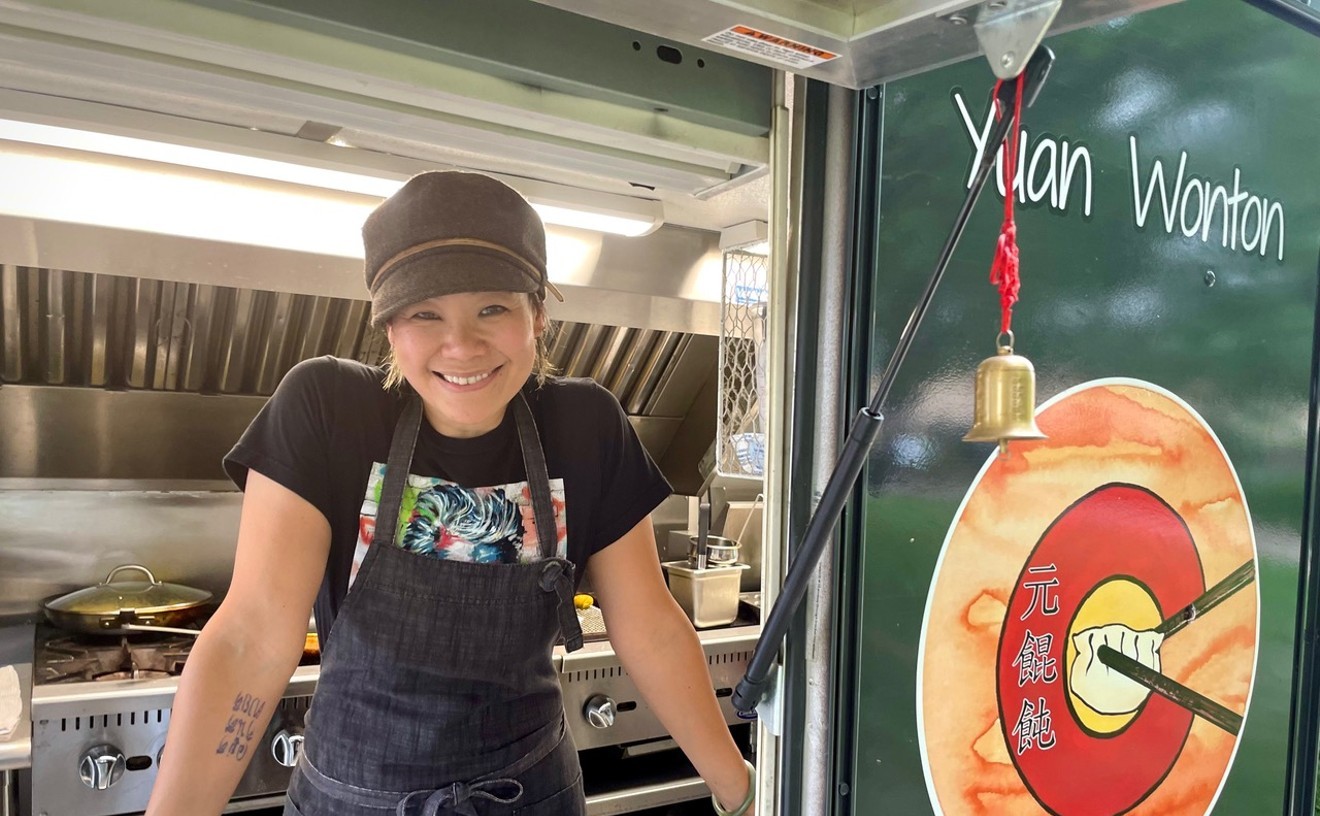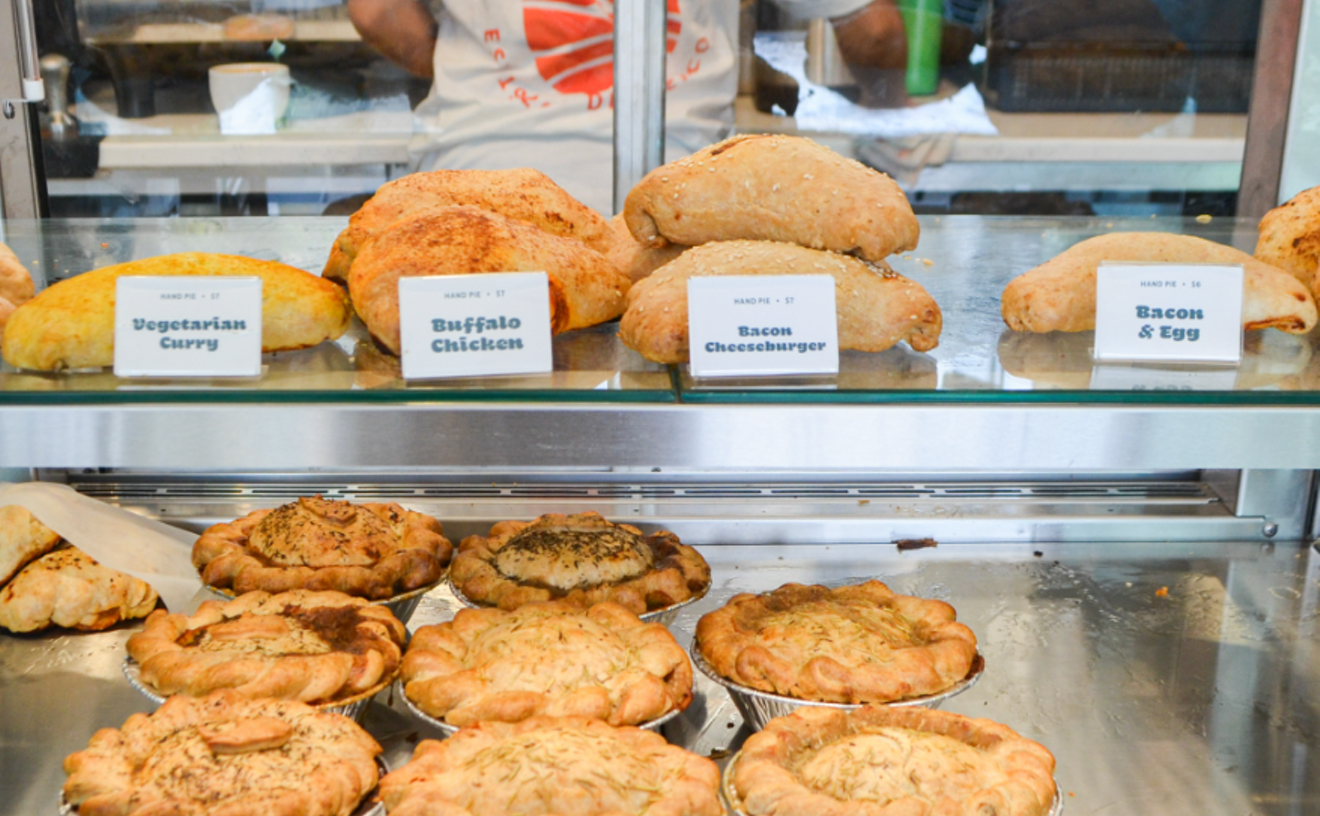See also: Scott Witsoe of Wit's End Brewing Talks Asian Ingredients and the Leap From Home Brewing
Kuklinski hasn't held the top position in the kitchen long; he transitioned over the course of a couple of months last winter, as Jasinski was focusing more and more on Stoic & Genuine, the seafood restaurant and raw bar she and Gruitch opened in Union Station in July. Surprisingly for an industry known for high turnover and even higher burnout rates, he has been with Jasinski for his entire professional cooking career -- more than eight years at this point. She hired the young cook immediately after he graduated from Johnson & Wales University, just two years after Rioja opened. "She really teaches," Kuklinski says. "I've been absorbing as much as I could for as long as I could."
Food has always been a part of his world. His childhood was spent mostly in the Midwest, specifically Nebraska, but his father's career as a communications officer in the Air Force led to a few moves around the country: New York, Pennsylvania, Oklahoma and Arizona. His mom was a nurse and worked days, but always put scratch-made dinners on the table. "Steak and potatoes, steak and asparagus -- this was in Nebraska," he points out.But she also cooked Italian and insisted on making her own sauce. "We harvested tomatoes every year in September, when it was hot and humid," Kuklinski recalls. The family would bring home two bushels of tomatoes, and his mom would put up twenty gallons of sauce to last through winter. It was her way, intentional or not, of "keeping the family together through food and meals."
Kuklinski also hunted -- quail at the age of eight and deer by the time he was ten -- with his father, who butchered his own kills, turning a deer into much more than the standard backstrap and a whole lot of ground venison. One of his most vivid food memories is of making venison stroganoff with his father. "It was so outside of what Mom made," he says. "Chopping dill, mixing in the sour cream -- I enjoyed it because I was part of creating it." He was proud of the dish, even if his mom and brother didn't care for the results.
Kuklinski now lives in Edgewater with his wife, Erin, and he wants to keep food and family meals a part of his new family's tradition, especially since the couple is expecting a baby in January. They still make the annual tomato harvest part of their autumn ritual, heading to Miller Family Farms to pick their fill -- but for months' worth of salsa instead of tomato sauce. As a chef, he likes working with his hands. "I have taken on home-improvement projects since my wife and I bought our home," he explains. "I built a 250-square-foot, multi-level deck off the back of my house and completed a full renovation of our master bath and master bedroom. My wife and I have also refinished all the hardwood floors. If I weren't a chef, I could see myself as a landscape architect, woodsmith, or someone who flips homes."
But Kuklinski is always thinking about food -- designing menus, working on recipes, teaching his crew. He recalls every element of dishes he's made, even the failures. "A huge part of being a chef is failing," he notes. A recent octopus dish that he considers one of the best items on Rioja's menu didn't come without plenty of trial and error: The combination of peach with the octopus was a result of seasonal availability paired with his love of fruit. "In general, I couldn't live without fruit," he says. "It's hardwired into every human on the planet to enjoy eating fruit. It can take on so many forms and perform so many functions in a dish." In this case, it was the silky smoothness of the sweet fruit in contrast with the slightly chewy texture of the seafood that struck him as particularly Mediterranean. With peaches nearing the end of the season, he plans to keep octopus on the menu, possibly in a puttanesca.
Women have heavily influenced Kuklinski's cooking career and style, from his mother to Jasinski to chef Dana Rodriguez, who helmed Jasinski and Gruitch's Bistro Vendôme before leaving to open Work & Class, and who's served as a mentor to many. The staff at Rioja is about evenly divided between men and women, which seems so natural that he doesn't give it much thought, other than to note that men tend to make everything a competition, and that a balance in the kitchen leads to more problem-solving and creativity: "A female chef thinks, 'I will do this differently than you...and better.'"
As for his own leadership style -- he doesn't consider it a style. "I think about it on an individual basis -- what does this person need?" he says. "I'm hands-off unless I'm needed, to let people take pride in what they do." With that octopus dish, for example, he remembers not being able to figure out a good way to plate it, so he let a sous-chef give it a go. "She made it into a beautiful twisting spiral in a bowl," he recalls. Kuklinski could talk all day about ingredients and techniques -- this fall it's pickles and other preservation techniques, sunchokes, pumpkins, pears -- but he has a kitchen to run, so we followed up with a few more questions.
Keep reading for a Q & A with chef Tim Kuklinski of Rioja.
Westword: What is your favorite kitchen tool?
Tim Kuklinski: There are two tools that I couldn't live without. The first is my tweezers, because of what they symbolize. The use of tweezers denotes patience, attention to detail and the pursuit of perfection. The second are my spoons, because of their functionality. I use spoons for countless things every day -- forming quenelles, portioning, stirring and, the most important of all, tasting. Every time I find myself in an antiques shop, I have to buy at least one.
What are some other ingredients you're working with?
Truffles are coming into season. Last year we did a chestnut cavatelli with chestnut flour pasta and shaved black truffles. At Grace [in Chicago, where Kuklinski staged], I had a simple risotto bianco, and they brought out a truffle the size of a baseball. It just made me giggle.
Any other ingredients that wowed you?
I had a red curry with a banana fritter that Jorel [Pierce, now chef at Stoic & Genuine] made. I never really liked bananas before that.
I like funk -- fish sauce. We make an eggplant kimchi; the flavor of the eggplant really comes through. I tried making kimchi with ramps, but the flavor of the ramps just got lost.
What's your favorite "guilty pleasure" food?
Santiago's burritos and Choco Tacos -- 'nuff said.
Do you have any favorite restaurants around town?
US Thai and Sloan's in Edgewater, and Lao Wang [on South Federal]. I liked Kobe An Shabu Shabu, but I'm a salt fiend -- next time, I'm trying it with the miso broth.
What's your proudest moment as a chef?
My proudest moments are when I can turn something from a negative into a positive. I am so satisfied when I can take scraps and turn them into a beautiful dish.
Not too long ago, I had a cook begin down a path that would ultimately end in jail time. Instead of giving in to the pressure to terminate his employment, I kept him as a part of our team, and he has turned into a leader in the kitchen.
I am also proud when someone that I have taught leaves Rioja to become a chef somewhere else. The vacancy left by these people hurts, but it is buffered by the knowledge that they are off doing things for themselves.
As far as food goes, there are a few dishes along the line that stand out in my memory as something special. The first dish I put onto the menu was a lobster pasta with tomatoes and herbs. I remember the first time someone called my food brilliant -- this came on a watermelon salad with jalapeños and lemon balm.
Follow @CafeWestword











